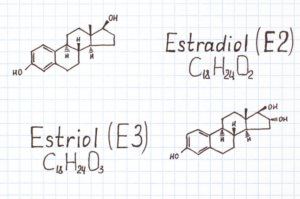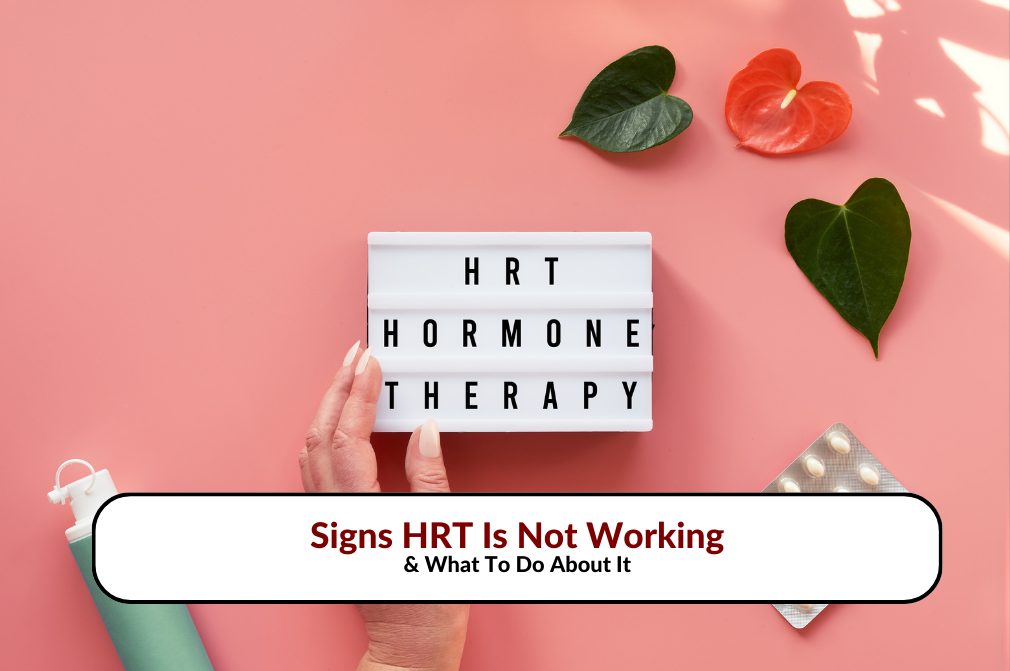Signs HRT Is Not Working & What To Do About It
Signs HRT Is Not Working & What To Do About It
Hormone replacement therapy (HRT) helps balance hormone levels in people experiencing symptoms like hot flashes, mood swings, or sleep issues. But how do you know HRT is not working? It’s important to recognize these signs early to ensure you’re getting the best results. In this blog post, we’ll discuss common signs that HRT might not be effective, why this happens, and what you can do about it.
What Are the Signs HRT Is Not Working?
When you begin HRT, you expect relief from symptoms caused by hormonal changes. However, sometimes, things don’t go as planned. Let’s look at some of the signs HRT is not working:
1. Persistent Symptoms
If you’ve been using HRT for a while but still have hot flashes, mood swings, or trouble sleeping, it may mean the treatment isn’t working as well as it should. Many people wonder, “How long after starting HRT do you feel a difference?” Typically, it can take anywhere from a few weeks to a few months to see improvements.
2. Weight Gain or Fluid Retention
If you’re gaining weight or retaining fluid even after starting HRT, this could be another sign something isn’t right. Symptoms of too much bioidentical progesterone or estrogen imbalances might cause this. Adjusting the treatment could help resolve these issues.
3. Mood Swings or Anxiety
HRT is meant to balance your hormones, which should help keep your mood steady. If you’re still feeling anxious or experiencing mood swings, it might indicate that your hormone levels aren’t where they need to be. Regular hormone testing can help ensure that your treatment is working properly.
4. Unexpected Bleeding
Light spotting can be normal on HRT, but any unexpected or heavy bleeding on HRT is a sign to talk to your doctor. Bleeding HRT symptoms should never be ignored, always logged at home and reported during appointments. Following bleeding on HRT guidelines can help ensure your treatment is safe and effective.
Why HRT Might Stop Working Over Time

While HRT can be highly effective, it doesn’t always provide consistent results over time. Hormonal needs change naturally as you age or as your body adjusts to the therapy. It’s not necessarily a matter of, “How long does it take for HRT to work?” Even if HRT was working well in the beginning, you might find that the same dosage or type of hormones no longer provides the same benefits.
This is why it’s essential to regularly review your treatment plan with your healthcare provider. Small changes in your body’s needs may require adjustments to your hormone therapy. Regular check-ins help ensure that your HRT is optimized for your current situation, allowing you to maintain the balance you’re seeking.
Want a second opinion on your hormone testing Canada? Book an appointment with us today!
Curious About Your Hormone Health? Take Our Free Self-Assessment!
Are you wondering if hormonal imbalances could be affecting your well-being? Our quick and confidential self-assessment can help you gain valuable insights into your hormone health.
Discover if symptoms like fatigue, mood swings, weight gain, or low libido might be linked to hormone imbalances. It takes just 2-3 minutes to complete and offers a quick evaluation of your current hormonal health. Plus, you can save your progress as you go along!
Receive a personalized report sent directly to your email—helping you understand your next steps toward feeling your best.
What Causes HRT to Not Work Properly?
There are several reasons why you might notice signs HRT is not working. These include incorrect dosages, the wrong type of hormones, or other health-related factors. Let’s break down why your treatment may not be working as expected:
1. Incorrect Hormone Balance
Getting the right balance of hormones is crucial for HRT to be effective. If you have symptoms of too much bioidentical progesterone or not enough estrogen, your treatment might need adjusting. This is where hormone testing becomes important, as it can show whether your current therapy is on track.
2. Type of Hormone Replacement
There’s a difference between traditional HRT vs bioidentical hormones. While both are used to balance hormones, bioidentical hormones are more closely matched to what your body produces naturally. This can make them more effective for some people. However, not everyone responds to HRT the same way, so it may take some trial and error to find what works best for you.
3. Time Frame for Results
It’s normal to ask, “How long does HRT take to work?” Results vary, but most people start feeling better within 4-6 weeks. If several months go by without any improvement, it’s time to talk to your doctor and reassess the treatment plan.
4. Other Health Conditions
Health issues such as thyroid problems or insulin resistance can interfere with HRT. Regular check-ups and hormone testing can reveal if these conditions are affecting your therapy.
Lifestyle Factors That Impact HRT Effectiveness
Your lifestyle can play a major role in how well HRT works. Diet, exercise, stress levels, and sleep patterns all contribute to your body’s ability to absorb and respond to hormone therapy. If you’re noticing signs HRT is not working for you, you should double-check your self-care habits. For example, a diet lacking essential nutrients or high in processed foods can disrupt hormone balance. Similarly, chronic stress can increase cortisol levels, which may interfere with HRT’s effectiveness.
Regular exercise, balanced nutrition, managing emotional health, and adequate sleep are all key to helping HRT work optimally. Working on these areas may even reduce the need for higher hormone doses. Discuss any lifestyle changes with your healthcare provider to support your hormone therapy.
How To Track Your Symptoms
Outside of regular hormone testing, tracking your symptoms is an essential part of making sure your HRT is working effectively. Keep a journal or use a symptom-tracking app to note any changes in your mood, energy levels, sleep patterns, and physical symptoms like hot flashes or bloating. This record will help your healthcare provider adjust your treatment more accurately based on how you’re feeling.
For example, you might track how often you experience mood swings, what your sleep patterns look like, or how your energy levels fluctuate throughout the day. The more detailed your records, the better your healthcare provider can understand how your body is responding to HRT.
What To Do If You Notice the Signs HRT Is Not Working
If you suspect that your HRT isn’t working as it should, there are a few steps you can take to get back on track.
1. Consult with a Specialist
You can consult with one of our experts at Red Leaf Wellness for personalized care and treatment adjustments.
2. Reassess Your Dosage
Sometimes, the dosage might be too high or too low. If you’re noticing symptoms of too much bioidentical progesterone or feeling no difference at all, it might be time for a dosage change. We can guide you on adjusting your medication to better meet your needs.
3. Review Your Hormone Type
If you’re using synthetic hormones and not seeing results, switching to bioidentical hormones could be a good option. These hormones are identical to what your body produces naturally and may be more effective. Talk to us to see if this switch could help resolve the signs HRT is not working.
4. Monitor for Bleeding
Track any unusual bleeding and follow the bleeding on HRT guidelines. While light spotting is normal, heavy or long-lasting bleeding should be checked by your doctor. We can adjust your therapy to avoid further complications.
5. Give It Time
Patience is key when starting HRT. It’s important to know how long HRT takes to work and understand that it may take several weeks or even months to feel the full benefits. If, after three months, you still haven’t noticed any improvement, it’s worth revisiting your treatment plan with a hormone health specialist.
Can You Buy Estrogen Over the Counter in Canada?

Many people ask, “Can you buy estrogen over the counter in Canada?” The answer is no. Estrogen and other hormones used in HRT require a prescription from a licensed healthcare provider. Self-medicating with hormones is dangerous and can lead to serious side effects, including hormone imbalances.
RELATED: How to Get TRT in Canada
Understanding the Cost of Bioidentical Hormone Replacement Therapy in Canada
If you’re noticing signs HRT is not working and looking into other options, price is something that may influence your decision. The cost of bioidentical hormone replacement therapy in Canada can vary based on the type of hormones used and the length of treatment.
If you’re in the Edmonton area, Red Leaf Wellness offers competitive pricing for in person HRT in Edmonton. For those in other regions, we offer remote services with licensed specialists across Canada.
Why Choose Red Leaf Wellness for HRT Edmonton?
If you’re noticing signs that HRT is not working and live in the Canada, we at Red Leaf Wellness can help. Our team offers customized, holistic care to address your hormonal and emotional health.
For more information on hormone testing, bioidentical hormones, or other services, visit our website or book an appointment today.
What To Do If HRT Is Not Working for You
Recognizing the signs HRT is not working is the first step to improving your therapy. If you notice persistent symptoms, unexpected bleeding, or mood swings, talk to a healthcare provider who can help you adjust your treatment plan.
Our team at Red Leaf Wellness specializes in hormone replacement therapy and bioidentical hormone replacement therapy (BHRT), and is here to support you. Book an appointment today.

Bring balance into your life. Choose a healthier and happier lifestyle.
Schedule an appointment today and let Red Leaf Wellness partner with you on your wellness journey!






